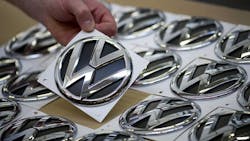VW Builds Europe's Biggest Electric Car Plant to Halt Tesla's March
Volkswagen AG will invest 1.2 billion euros ($1.4 billion) to revamp a plant in eastern Germany into Europe’s largest electric-car factory, giving chase to Tesla Inc.’s move into affordable zero-emission vehicles.
“We will lead e-mobility out of the niche and make the e-car accessible for millions of people,” Thomas Ulbrich, the VW brand’s head of electric-cars, told reporters in Zwickau Thursday. Electric-vehicle output will get underway in a about a year’s time, he said, with both cars and battery cells made using renewable energy.
The Zwickau site, about an hour’s drive from the eastern German city of Leipzig currently churning out Golf hatchbacks, will manufacture up to 330,000 electric vehicles per year.
The move is part of a plan to produce some 50 battery-powered models across VW’s 12 auto brands by 2025. A smooth changeover from making thousands of combustion-engine vehicles every day will be vital for VW to defend its global leadership among incumbent rivals, while fending off new alternatives to traditional car ownership.
The world’s biggest carmaker has little time to lose. Tesla is taking strides in resolving manufacturing problems at its U.S. factory, and plans to start selling the mass-market Model 3 early next year in Europe. In the U.S., the Model 3 has become a best-seller, beating all but a handful of Toyota and Honda sedans during the third quarter.
Zwickau is set to start making six different electric models from three VW group brands including the I.D. battery-car range as of 2021:
The I.D. Neo hatchback is set to roll off assembly lines in November 2019 and hit European showrooms in the following year priced at around 23,000 euros. The I.D. Crozz, a compact crossover, is planned for sale in Europe, China and the U.S. One further I.D. variant not announced yet, as well as two Audi and one Seat brand models. The I.D. Lounge, a more spacious sport utility vehicle, will follow by 2023 at a factory that’s yet to be identified.VW on Wednesday added to its high-stakes electric-vehicle push by adding two more plants in Germany, despite fairly tepid adoption so far in Europe. The decision at the Emden and Hanover sites, which will mean fewer workers will be required to piece together simpler electric cars, included a commitment of making no layoffs until the end of 2028 to appease powerful labor unions.
“We will build the e-car for millions, not just for millionaires,” Ulbrich said. VW’s massive scale in production and development will help offset lower returns on the first generation of electric cars compared to combustion engine vehicles.
Battery cells used in Zwickau will come from Poland and Hungary, where suppliers have agreed to use green energy despite coal dominating energy production in both countries.
In 2020, VW plans to ramp up electric-car output at two factories in China. VW’s only U.S. car factory in Chattanooga is “first choice” to produce electric cars for the North American market, according to Ulbrich. Talks are ongoing with a final decision expected in a few weeks, he said. VW has a production network of some 120 plants.
Across the VW group, the German company expects to sell between 2 million and 3 million purely electric cars by 2025, representing about a quarter of global vehicle sales. VW’s supervisory board is set to vote on the company’s investment plan for coming years at a meeting on Friday.
About the Author
Bloomberg
Licensed content from Bloomberg, copyright 2016.
